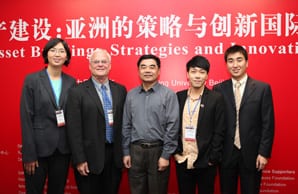Asset building has emerged with growing interest in Asia, as innovations are occurring in social policies, economic development strategies, and financial products and services. The Conference on Lifelong Asset Building: Strategies and Innovations in Asia, taking place this weekend in Beijing, will harness the experiences and brainpower of leading scholars, policy makers, practitioners, corporate leaders and funders from around the world. The conference not only provides a platform for sharing advances in asset building policies and programs, but also builds a network of stakeholders who will explore strategies and chart promising directions to advance asset building in Asia and beyond. 
Asset building refers to strategies that increase financial and tangible assets, such as savings, homes and businesses, and policy focuses on the long-term development of individuals, families and communities. “Several countries in East and Southeast Asia have been quite innovative in creating policies and programs that build assets for family and community development,” said Michael Sherraden, Center for Social Development founder and director. “At this conference, countries will learn from each other, and all of this experience can inform innovations in the United States and elsewhere. It seems likely that universal and progressive asset-based policies will play a larger role in many countries in the years ahead.”
Key topics to be discussed at the conference include, national asset building policies, savings for children and youth, community-based social entrepreneurship, innovations and research in asset building, and asset building policy diffusion. Presenters are experts in their respective fields in 14 different countries. The connections made within this diverse network of leaders will be valuable in advancing innovations for more comprehensive and inclusive asset building throughout the life course.
“Asset building is a relatively new social policy theory and an important practice,” said WANG Sibin, professor of sociology at Peking University and co-director of Peking University-Hong Kong Polytechnic University China Social Work Research Center. “It aims at connecting the future with the present and emphasizes intergenerational ties, which will enhance the security of disadvantaged populations, help them to survive and support their development. Although China has a favorable cultural environment for asset building, the assets accessible to the poor and the disadvantaged are very limited. Thus, promoting asset building is very meaningful to the Chinese society in a broader sense. I believe the conference hosted at Peking University on asset building will yield fruitful results and contribute to the asset building theories of Professor Michael Sherraden.”
Conference organizers are Hong Kong Polytechnic University and Peking University China Social Work Research Center; Center for Social Development, Washington University in St. Louis; Centre for Social Development (Asia), National University of Singapore; and China Association for Social Work Education. Conference supporters are Levi Strauss Foundation; Keswick Foundation; McDonnell International Scholars Academy at Washington University in St. Louis; and Ford Foundation. Six McDonnell International partner universities will be represented at the conference.
“Washington University in St. Louis is proud to partner with Peking University, Hong Kong Polytechnic University, National University of Singapore, and others in organizing this Conference on Lifelong Asset Building: Innovations and Strategies in Asia. With aging populations in many countries, building assets over the life course will be fundamental for both economic development and security in old age,” said James Wertsch, director of the McDonnell International Scholars Academy.
The conference will produce publications in both Chinese, published by Peking University Press, and English, published by the Taylor & Francis Group, as well as continued learning exchange among the network of researchers, practitioners, policy makers and funders.
The Center for Social Development has served as the impetus for great strides in asset building throughout Asia. The center has served in an advisory role, and has helped to test asset-building innovations in several countries. The region looks to CSD to recommend policies that can be adapted to each country’s specific economies and social arrangements.
For instance, Singapore is now a model itself for matched savings accounts, beginning when its citizens are children and following them through retirement. South Korea and Taiwan have begun offering such accounts, as well, patterned after the United States’ Individual Development Account programs. Governments in East and Southeast Asia are using CSD research to develop their own policies, and are continually increasing the impact of those programs and strategies. That growth will be evident this week in Beijing, as experts sit down together to share triumphs and challenges, and collaborate for future progress.